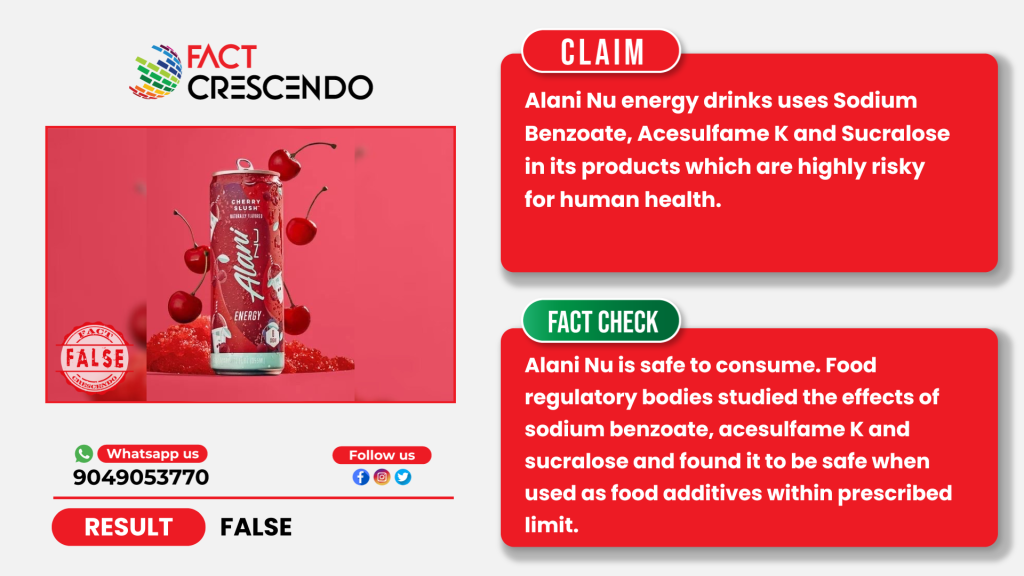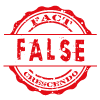
Recently, one of the famous energy drinks brand Alani Nu had been accused of using harmful ingredients like Sodium Benzoate, Acesulfame K and sucralose in its products. Users are claiming that these ingredients lead to serious health issues.
However, Fact Crescendo found the claim to be false. All the three ingredients, sodium benzoate, acesulfame K and sucralose have been approved by food regulatory bodies to be used as additives.
Fact Check-
Alani Nu energy drinks do contain ingredients like Carbonated Water, Citric Acid, Taurine, sodium benzoate, acesulfame K, sucralose etc.
But are the ingredients mentioned in the post really harmful for health? Lets check the truth.
Sodium Benzoate:
Sodium benzoate is a chemical made by mixing benzoic acid with substances like baking soda or sodium hydroxide. It does not occur naturally. According to the Code of Federal Regulations, it is generally safe when used according to good manufacturing practices, with a maximum limit of 0.1% in food. The FDA has not confirmed its safety for other uses.
The European Food Safety Authority (EFSA) evaluated a study from Southampton University that suggested certain food additives, including artificial colors and sodium benzoate, might be linked to hyperactivity in children. EFSA reviewed the study and found that while some children may be sensitive to these additives, the overall evidence was not strong enough to confirm a direct link to hyperactivity. Based on this, EFSA did not change the safety limits for these additives but recommended further research.
Acesulfame potassium (E950):
Acesulfame potassium, also known as Ace-K or E950 has been approved by FDA for use in food as a sweetener. The FDA approved acesulfame potassium (Ace-K) as a food additive in 1988 for certain foods and beverages, and in 2003, it was approved as a general sweetener and flavor enhancer. To ensure its safety, the FDA reviewed over 90 studies that looked at potential toxic effects, including its impact on reproduction, cancer risk, and metabolism.
According to another report, the FDA and National Cancer Institute (NCI) had confirmed that Ace-K is safe and that there is enough evidence to say that it does not cause cancer. In 2005, the National Toxicology Program conducted a large animal study where they gave mice acesulfame potassium, making up 3% of their diet, for over 40 weeks. This is roughly equal to a person consuming more than 1,000 cans of soft drinks daily. The study found no evidence of an increased risk of cancer in the mice.
Sucralose:
Some studies show that sucralose can affect your gut by reducing good bacteria by half. Research on animals also suggests that it may cause inflammation in the body. Too much inflammation over time can lead to health problems like obesity and diabetes.
However, sucralose is approved for use in food as a sweetener. It is sold under the brand name Splenda. The FDA approved sucralose for use in 15 food categories in 1998 and for use as a general-purpose sweetener for foods in 1999, under certain conditions of use. To determine the safety of sucralose, the FDA reviewed more than 110 studies designed to identify possible toxic effects, including studies on the reproductive and nervous systems, carcinogenicity, and metabolism. The FDA also reviewed human clinical trials to address metabolism and effects on patients with diabetes.
Below you can see the safe limit for each sweetener and the amount a person would need to consume to reach Acceptable Daily Intake (ADI).
Conclusion:
Fact Crescendo found the claim to be false. Food regulatory bodies studied the effects of sodium benzoate, acesulfame K and sucralose and found it to be safe when used as food additives within prescribed limit.

Title:Alani Nu drinks are safe to consume. Ingredients like Sodium Benzoate, Acesulfame K and Sucralose are approved by food regulatory bodies.
Written By: Siddharth SahuResult: False


